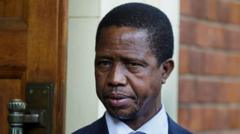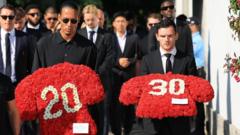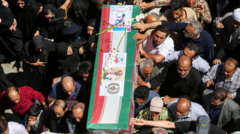As Zambia grapples with the fallout from Edgar Lungu's death and the ensuing funeral conflict, political and familial tensions reveal the chasms within the nation.
"Divided Over Dignity: Zambia's Controversial Funeral Debate"

"Divided Over Dignity: Zambia's Controversial Funeral Debate"
The death of ex-President Edgar Lungu has sparked deep divisions in Zambia, igniting disputes over his burial.
In a twisting saga that has captivated Zambia, the death of former President Edgar Lungu has ignited a fierce debate about the handling of his remains. The 68-year-old leader passed away two months ago in South Africa, and recent legal rulings have granted the Zambian government rights to repatriate his body for a state funeral, despite objections from his family. The phrase "It's coming home," traditionally associated with English football fans, was adopted by some within the ruling party, underscoring the contentious nature of this saga as celebrations erupted among supporters.
The emotional turmoil surrounding Lungu's demise has led to divisions that overshadow pressing political and economic issues. Lungu's widow, Esther, and his family are adamant about honoring his wishes to exclude current President Hakainde Hichilema from his funeral—a request stemming from their fraught history, marked by Hichilema's earlier imprisonment and accusations of persecution during Lungu's presidency. This feud is now compounded by further claims of witchcraft, reflecting broader societal beliefs.
In South Africa, Courthouse scenes turned chaotic as Lungu's sister, Bertha, expressed her outrage and sorrow, challenging government officials present. As the family appeals the court's decision, they remain determined to ensure a burial that aligns with their values, even if it means further delays. The Zambian authorities assert their intent to conduct a state funeral, which they believe would be a fitting tribute, but tensions rise as the Lungu family threatens to boycott the proceedings if their demands are ignored.
Critics, including historians, decry government statements suggesting burial without the family's involvement, positing that such actions risk cultural insensitivity and deepen political fissures. Meanwhile, Hichilema's government insists on the necessity of uniting the nation through a state funeral, positioning itself in a complex dance between public sentiment and political obligation.
Despite the controversy, Zambians seem caught in a cycle of grief and distrust, as discussions about Lungu's final resting place dominate headlines. The outcome of this funeral debate remains uncertain, but its ramifications will likely reverberate throughout Zambian society for years to come.
The emotional turmoil surrounding Lungu's demise has led to divisions that overshadow pressing political and economic issues. Lungu's widow, Esther, and his family are adamant about honoring his wishes to exclude current President Hakainde Hichilema from his funeral—a request stemming from their fraught history, marked by Hichilema's earlier imprisonment and accusations of persecution during Lungu's presidency. This feud is now compounded by further claims of witchcraft, reflecting broader societal beliefs.
In South Africa, Courthouse scenes turned chaotic as Lungu's sister, Bertha, expressed her outrage and sorrow, challenging government officials present. As the family appeals the court's decision, they remain determined to ensure a burial that aligns with their values, even if it means further delays. The Zambian authorities assert their intent to conduct a state funeral, which they believe would be a fitting tribute, but tensions rise as the Lungu family threatens to boycott the proceedings if their demands are ignored.
Critics, including historians, decry government statements suggesting burial without the family's involvement, positing that such actions risk cultural insensitivity and deepen political fissures. Meanwhile, Hichilema's government insists on the necessity of uniting the nation through a state funeral, positioning itself in a complex dance between public sentiment and political obligation.
Despite the controversy, Zambians seem caught in a cycle of grief and distrust, as discussions about Lungu's final resting place dominate headlines. The outcome of this funeral debate remains uncertain, but its ramifications will likely reverberate throughout Zambian society for years to come.





















